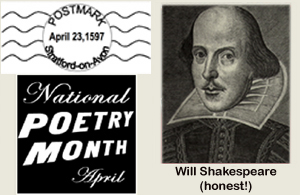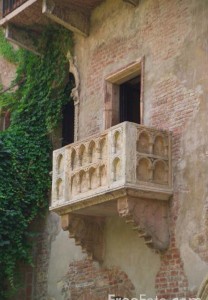National Poetry Month Ends: Happy Birthday, Will Shakespeare!
 In honor of the birthday (April 23) of the world’s greatest poet and playwright, we add to our month-long poetry reading what some consider the greatest pair of love poems in the language.
In honor of the birthday (April 23) of the world’s greatest poet and playwright, we add to our month-long poetry reading what some consider the greatest pair of love poems in the language.
Romeo speaks first as he looks up at Juliet’s balcony and catches a glimpse of her as she laments the unfairness of falling in love with a boy whose family is the sworn enemy of her family. Meanwhile, he thinks about how nice it would be to touch her cheek (but he says it nicely, for a guy . . . ).
Then, she speaks some widely misunderstood lines, wondering WHY (remember, “wherefore” = “why”) WHY he is Romeo? WHY he must be a Montague? She also wonders why he wouldn’t be willing to solve the problem by giving up his name, since she is willing to give up hers (a legitimate question, eh?).
ROMEO AND JULIET
Act 2, Scene 2
ROMEO
But, soft! what light through yonder window breaks?
It is the east, and Juliet is the sun.
Arise, fair sun, and kill the envious moon,
Who is already sick and pale with grief,
That thou her maid art far more fair than she:
Be not her maid, since she is envious;
Her vestal livery is but sick and green
And none but fools do wear it; cast it off.
It is my lady, O, it is my love!
O, that she knew she were!
She speaks yet she says nothing: what of that?
Her eye discourses; I will answer it.
I am too bold, ’tis not to me she speaks:
Two of the fairest stars in all the heaven,
Having some business, do entreat her eyes
To twinkle in their spheres till they return.
What if her eyes were there, they in her head?
The brightness of her cheek would shame those stars,
As daylight doth a lamp; her eyes in heaven
Would through the airy region stream so bright
That birds would sing and think it were not night.
See, how she leans her cheek upon her hand!
O, that I were a glove upon that hand,
That I might touch that cheek!
JULIET
Ay me!
ROMEO
She speaks:
O, speak again, bright angel! for thou art
As glorious to this night, being o’er my head
As is a winged messenger of heaven
Unto the white-upturned wondering eyes
Of mortals that fall back to gaze on him
When he bestrides the lazy-pacing clouds
And sails upon the bosom of the air.
JULIET
O Romeo, Romeo! wherefore art thou Romeo?
Deny thy father and refuse thy name
Or, if thou wilt not, be but sworn my love,
And I’ll no longer be a Capulet.
ROMEO
[Aside] Shall I hear more, or shall I speak at this?
JULIET
‘Tis but thy name that is my enemy;
Thou art thyself, though not a Montague.
What’s Montague? it is nor hand, nor foot,
Nor arm, nor face, nor any other part
Belonging to a man. O, be some other name!
What’s in a name? that which we call a rose
By any other name would smell as sweet;
So Romeo would, were he not Romeo call’d,
Retain that dear perfection which he owes
Without that title. Romeo, doff thy name,
And for that name which is no part of thee
Take all myself.
=================================
Preview of Coming Attractions
 In June, Gretta and I plan to drop by and visit this balcony in Verona, which the locals claim is THE balcony in this famous scene. William Shakespeare, son of John Shakespeare, never visited Verona; but his characters do have some pretty impressive Veronese roots. In 1597, when Shakespeare wrote Romeo & Juliet, Luigi Da Porta’s 1530 story of Romeo Montecchi and Giulietta Cappelletti (names taken from Dante’s Purgatorio) was fairly well known to many of Shakespeare’s contemporaries, as were other published versions by Bandello (1554) and The Tragicall Historye of Romeus and Juliett (1562) attributed to Arthur Brooke. Events in the play have caused some to make connections to real characters and events (including an earthquake in Italy in 1570 and a duel in 1581 with familiar details). All of this has led to conspiracy theories questioning Shakespeare’s authorship.
In June, Gretta and I plan to drop by and visit this balcony in Verona, which the locals claim is THE balcony in this famous scene. William Shakespeare, son of John Shakespeare, never visited Verona; but his characters do have some pretty impressive Veronese roots. In 1597, when Shakespeare wrote Romeo & Juliet, Luigi Da Porta’s 1530 story of Romeo Montecchi and Giulietta Cappelletti (names taken from Dante’s Purgatorio) was fairly well known to many of Shakespeare’s contemporaries, as were other published versions by Bandello (1554) and The Tragicall Historye of Romeus and Juliett (1562) attributed to Arthur Brooke. Events in the play have caused some to make connections to real characters and events (including an earthquake in Italy in 1570 and a duel in 1581 with familiar details). All of this has led to conspiracy theories questioning Shakespeare’s authorship.
I, of course, am convinced that Shakespeare wrote this play (and others set in Italy) from stories told to him by travelers (perhaps Christopher Marlowe) who had visited Verona. I have been, so far, unconvinced that Christopher Marlowe escaped from a deadly scandal by faking his own death and emerging in London as William Shakespeare and suddenly becoming the greatest poet and playwright of all time. However, I am about the read James Shapiro’s new book Contested Will: Who Wrote Shakespeare?, which focuses on this subject; so, I’ll get back to you on that . . . Perhaps standing beneath “Juliet’s” balcony, the truth will emerge.
=================
One more
This is my last post in honor of National Poetry Month. A new reader to this blog Shelley Clements, has sent us a few of hers and and I offer one of them below. She sent more, but, heck, perhaps appearing on the same page with two of Shakespeare’s will be comforting. I like this one.
Code Breaker
by Shelley Clements
i read and
re read
your poetry
i try to lure your words to me
coax them out softly
whisper them aloud
as if they were my own
i patch the inadequacies
with my own imaginings
yours are too spare
too lacking in enthusiasms:
a neglected wheel barrow
frost flecked and rust ready
keeping company with chalky hens
depends so much upon
finding resonance in
each word each line
of your “masterful” poem
i read and
re read
your poetry
i try to decrypt your words
as if they were precious glyphs
divine their meaning as if they were smoke
but i lack the language of the Navajo
==========
NOW, it is time to start thinking about Italy and Austria.
Shelley,
I enjoyed your poem and it made me emulate what it described. I thought I found resonance with the poetry of Robert Frost that all American students “study” in school. When I was in college (an almost English major, managing to avoid American poets almost entirely, and stopping short by avoiding the Shakespeare course and the major-author course to study computer science instead), I would have had to do too much work to figure out if Frost had written a poem about a wheel barrow (strange to split it into two words) and chalky hens.
Thanks to the achievements of my later-chosen profession, I was able to Google “Robert Frost chalky hens” and when that failed me, “Robert Frost wheelbarrow”. Voila! It revealed a poem by an author I barely spent a few hours with as an English major:
============
William Carlos Williams:
The Red Wheelbarrow
so much depends
upon
a red wheel
barrow
glazed with rain
water
beside the white
chickens.
==========
With a combination of instincts/experience, curiosity, the right technology or skills, time, and persistence, even the uninitiated can learn to decode Navajo!
Thanks for the poem!
I “decoded” yours, but have you decoded Williams’ poem? That would appear to also take an incredible imagination or knowledge of how a wheelbarrow gets used to feed the chickens and the people to tend the chickens. I imagine it starts with what gets most often moved around by wheelbarrow on a farm!